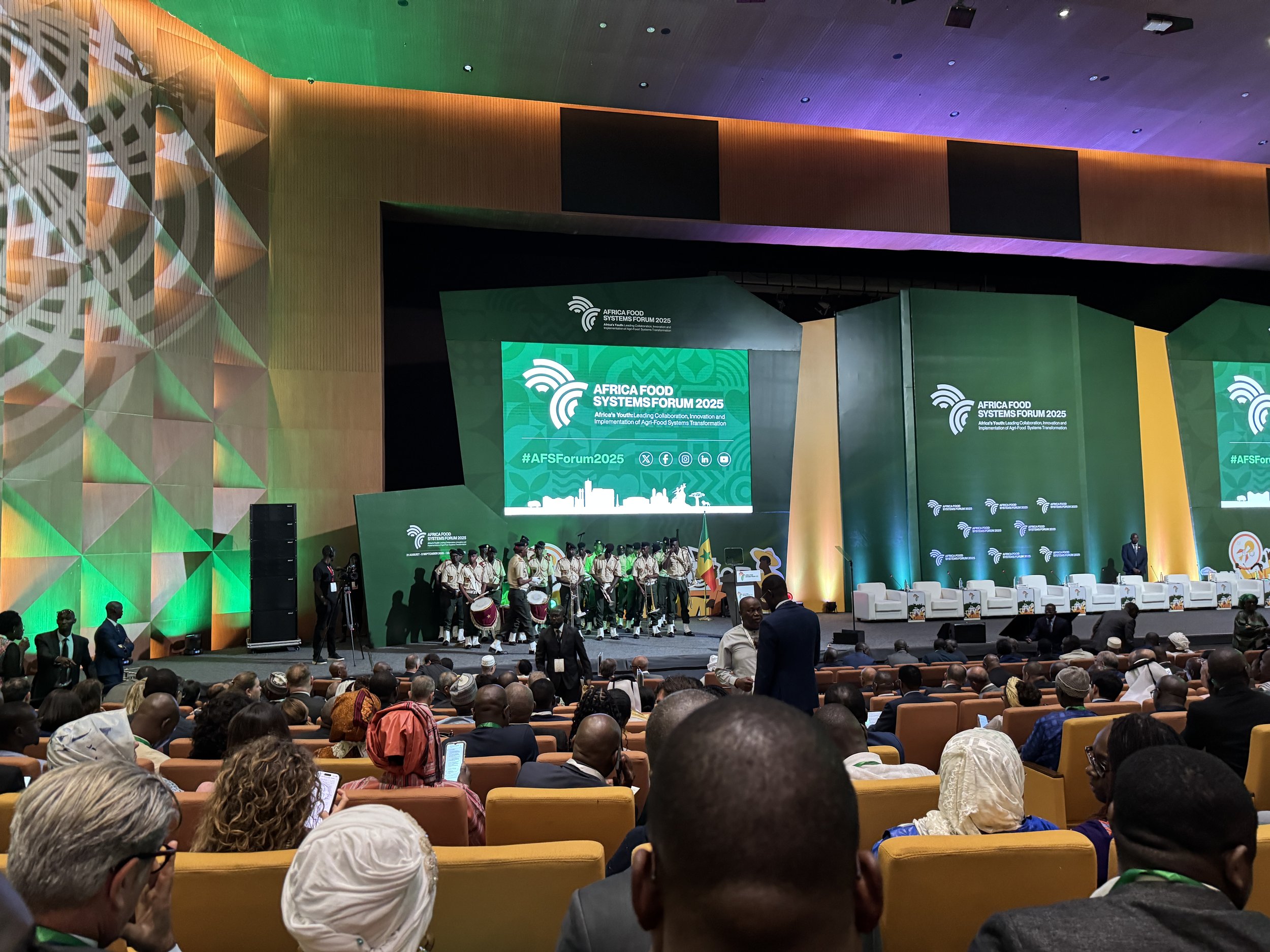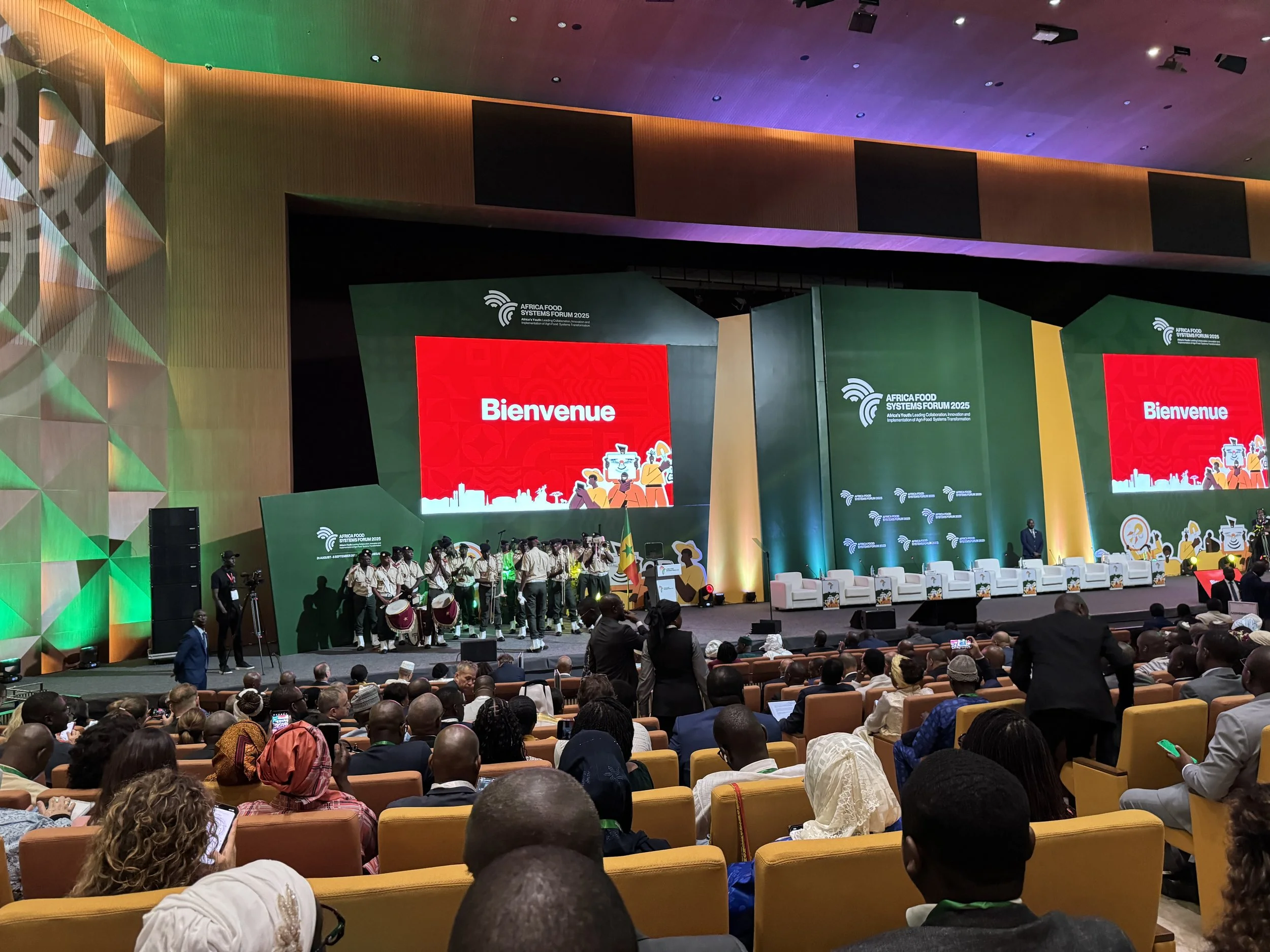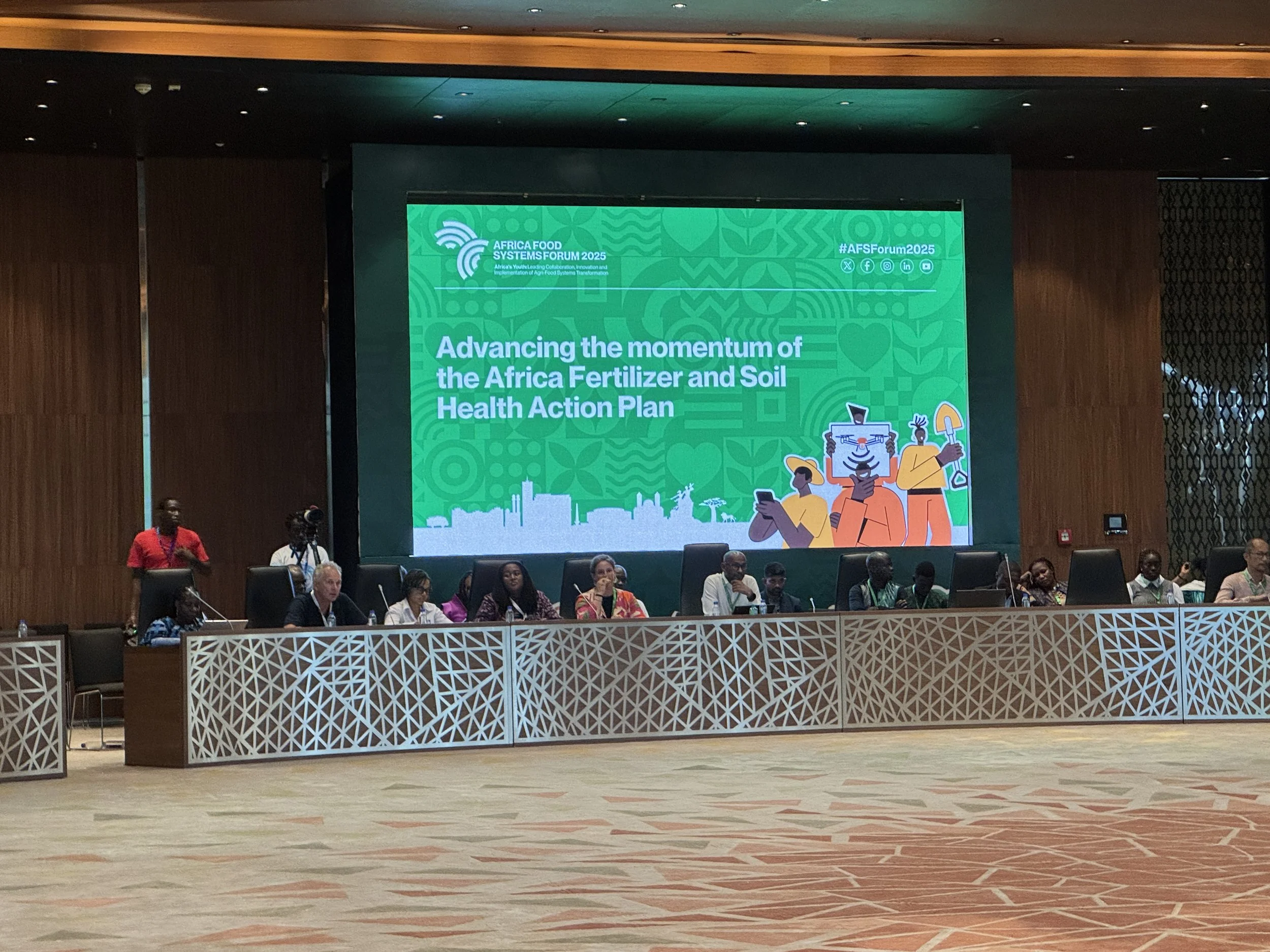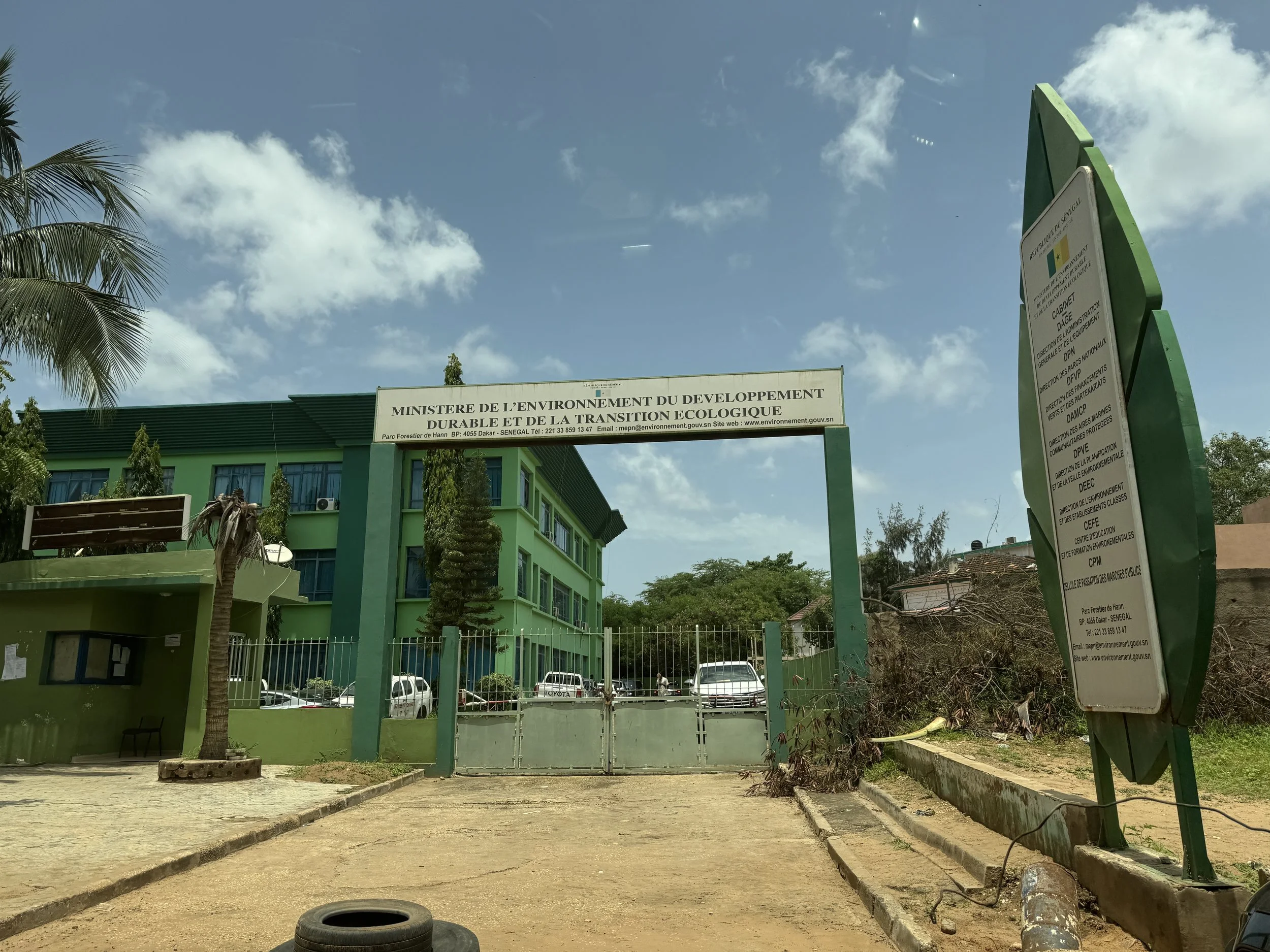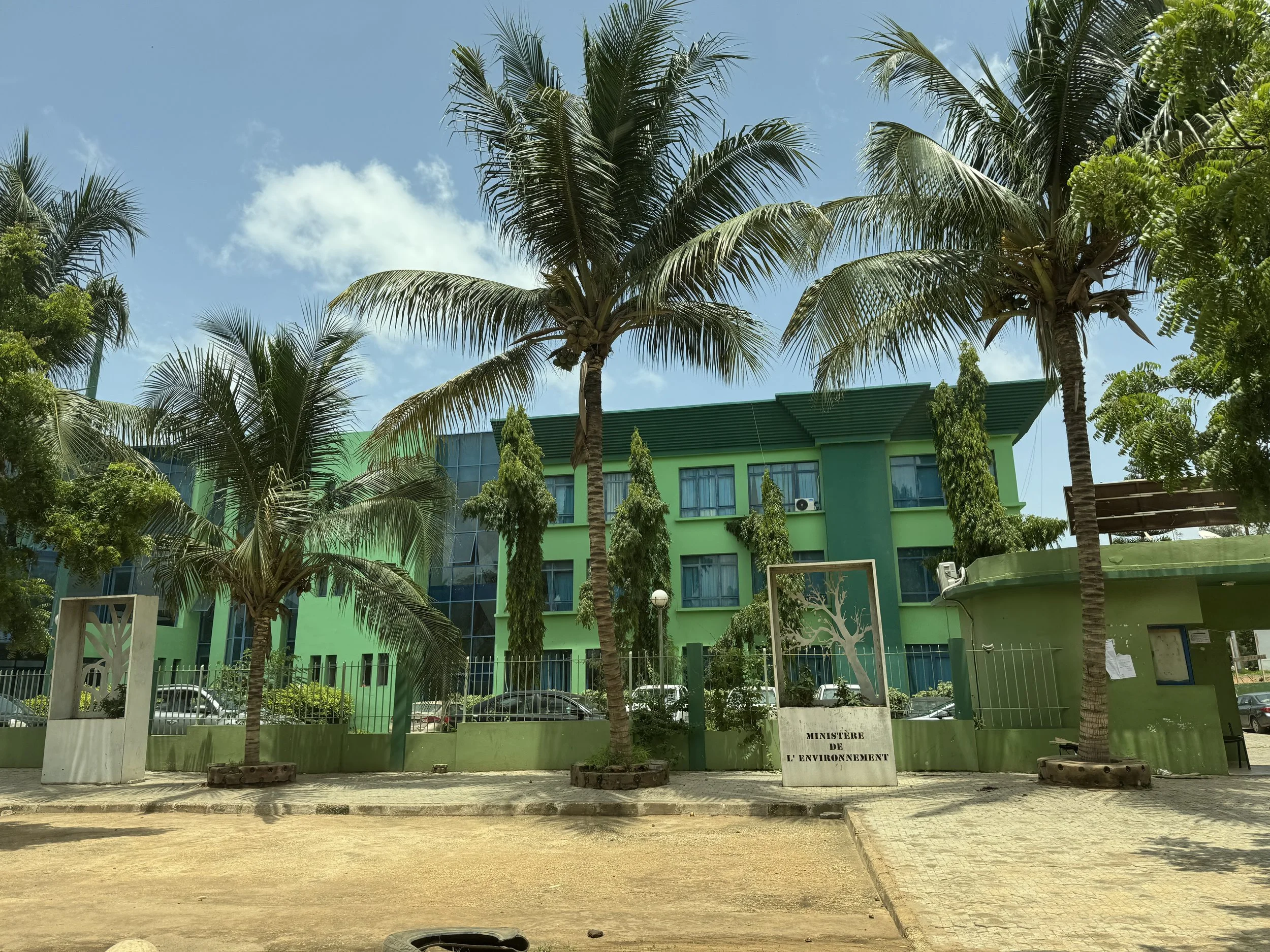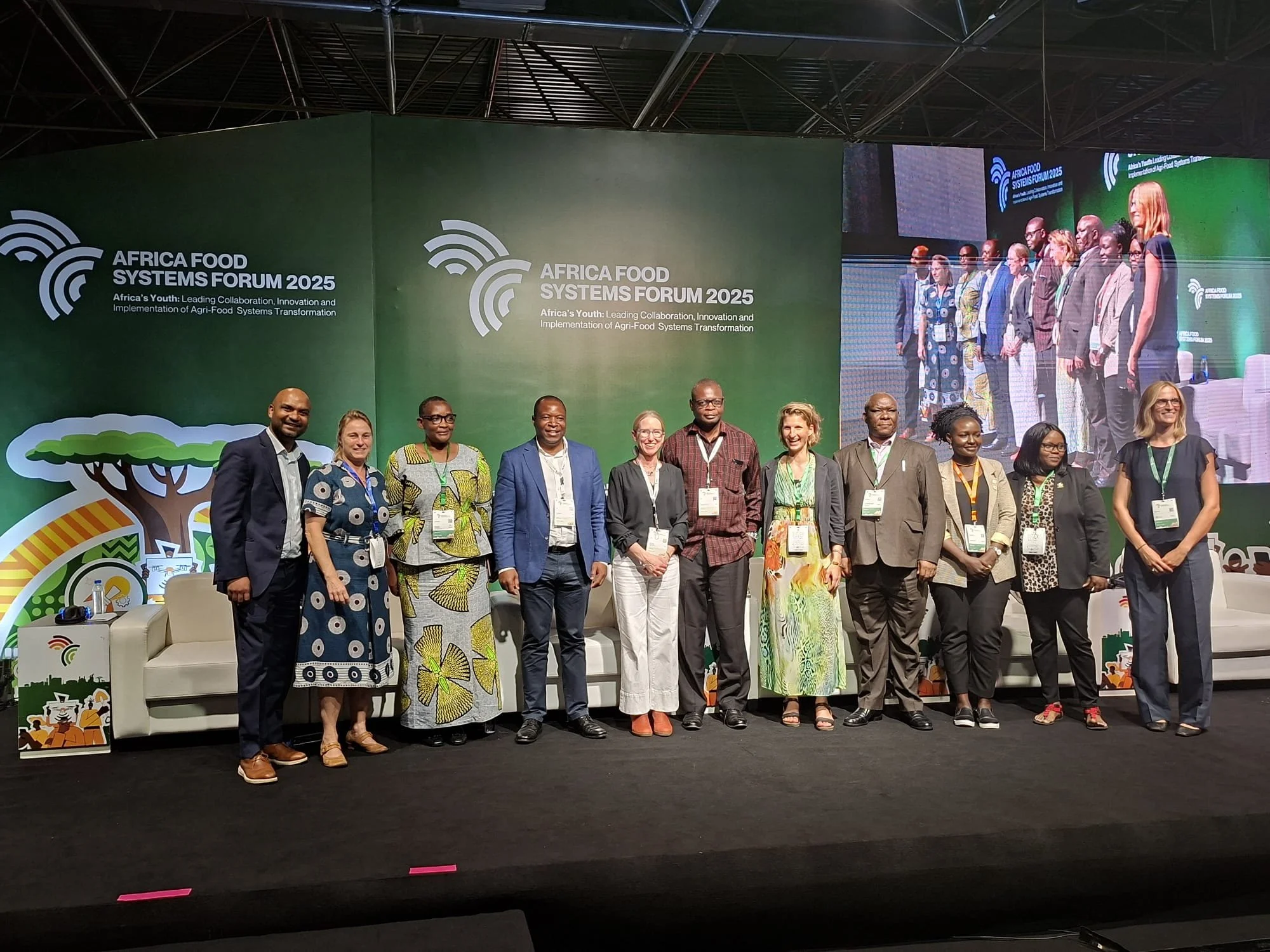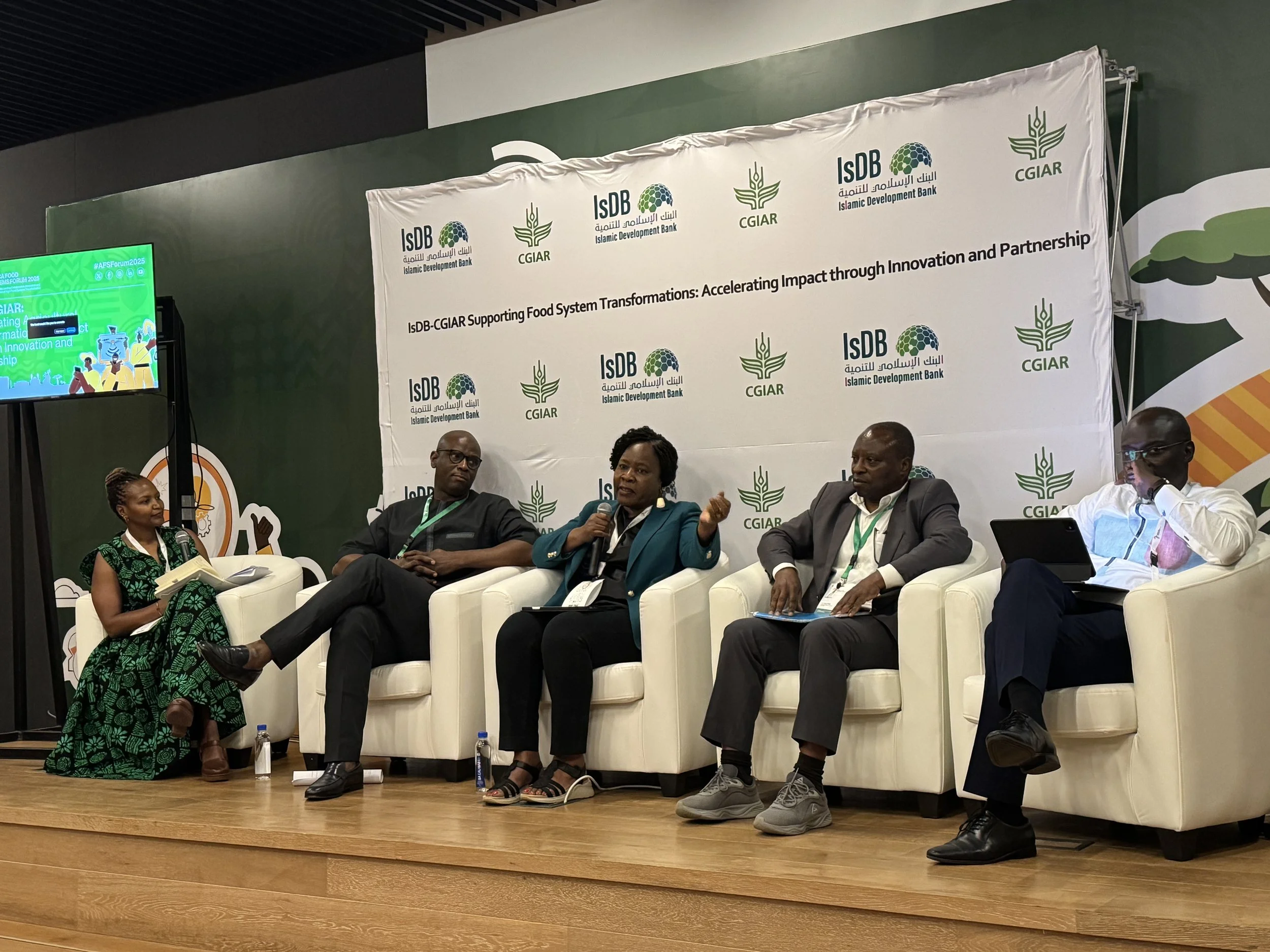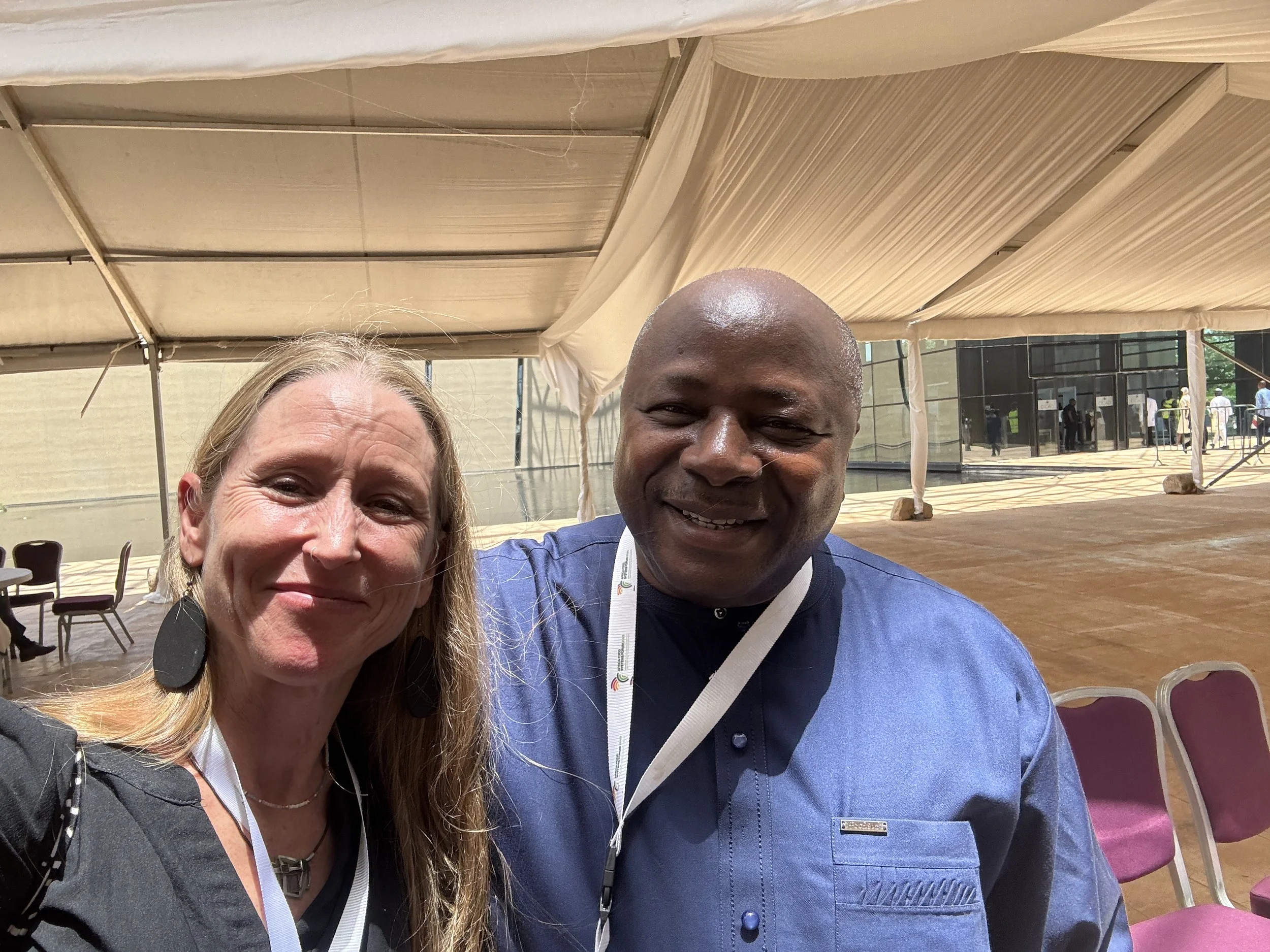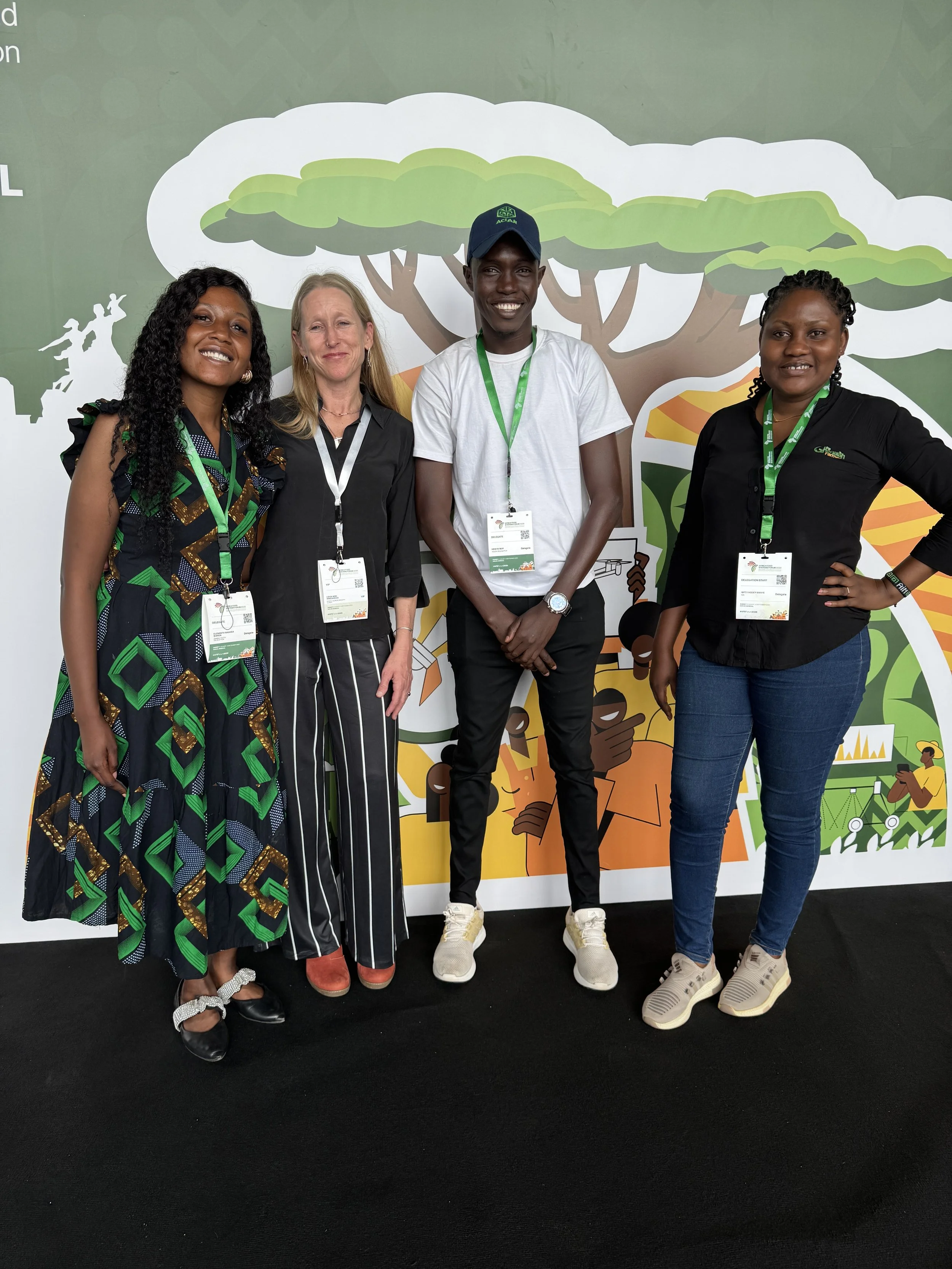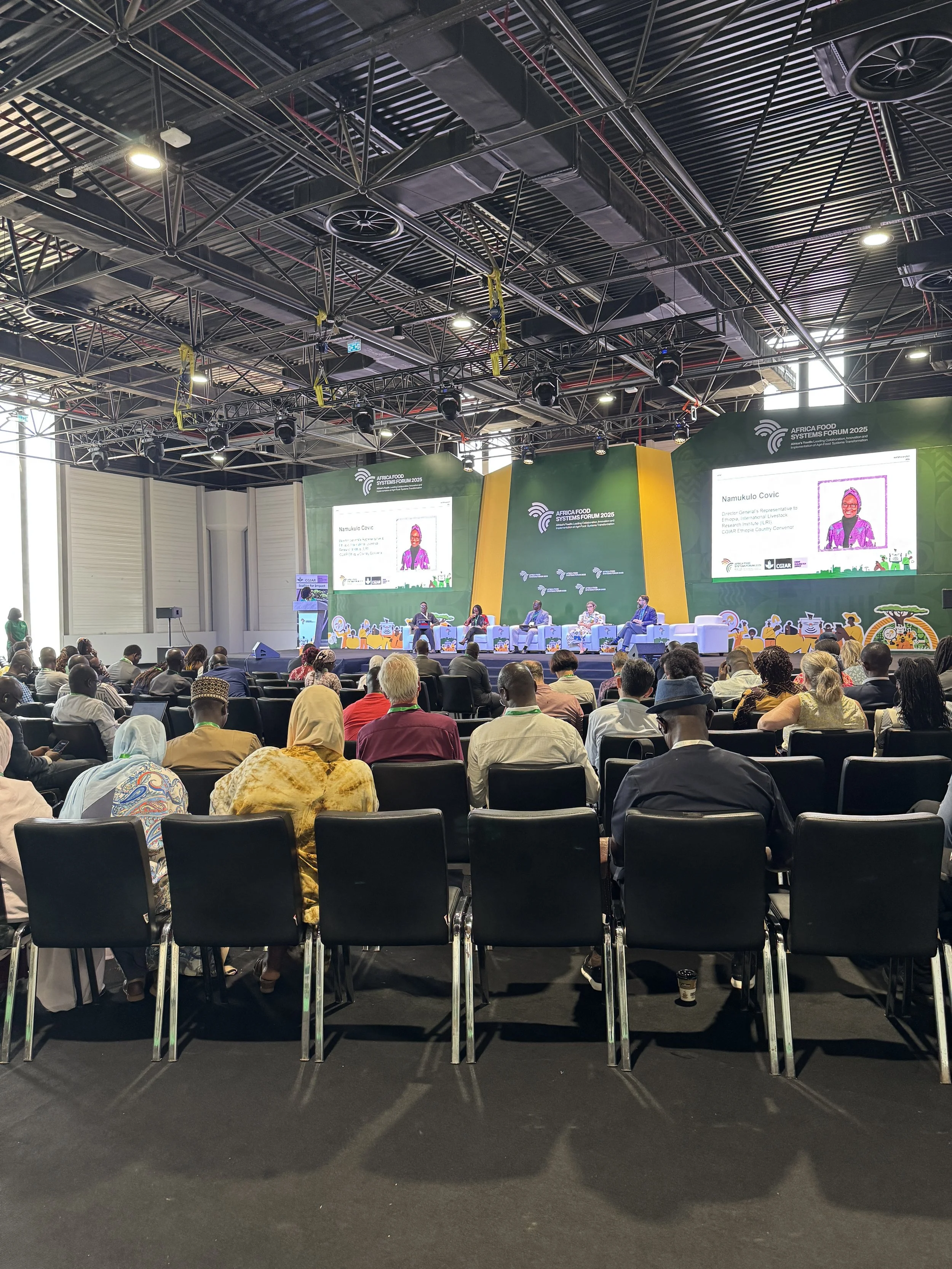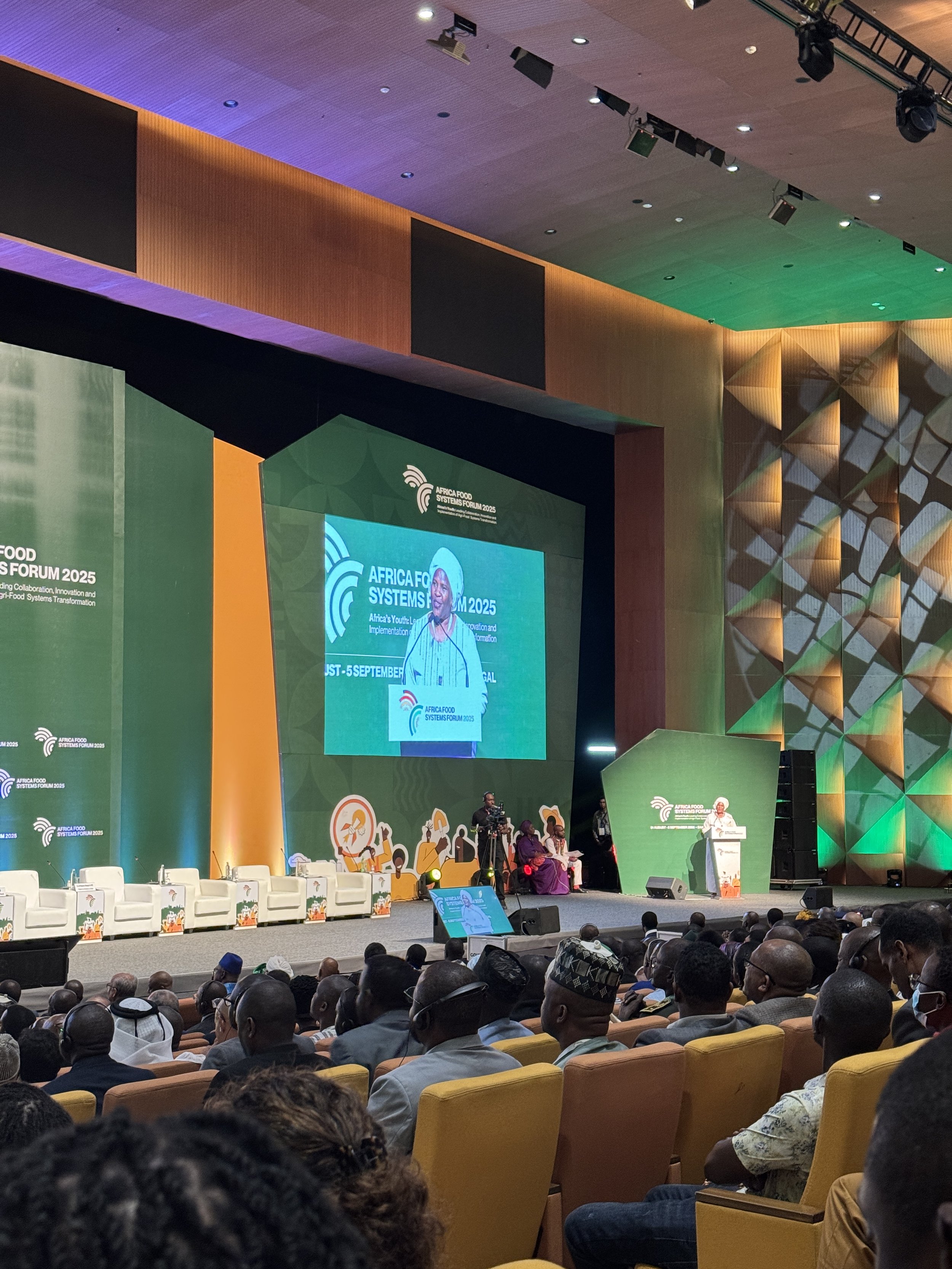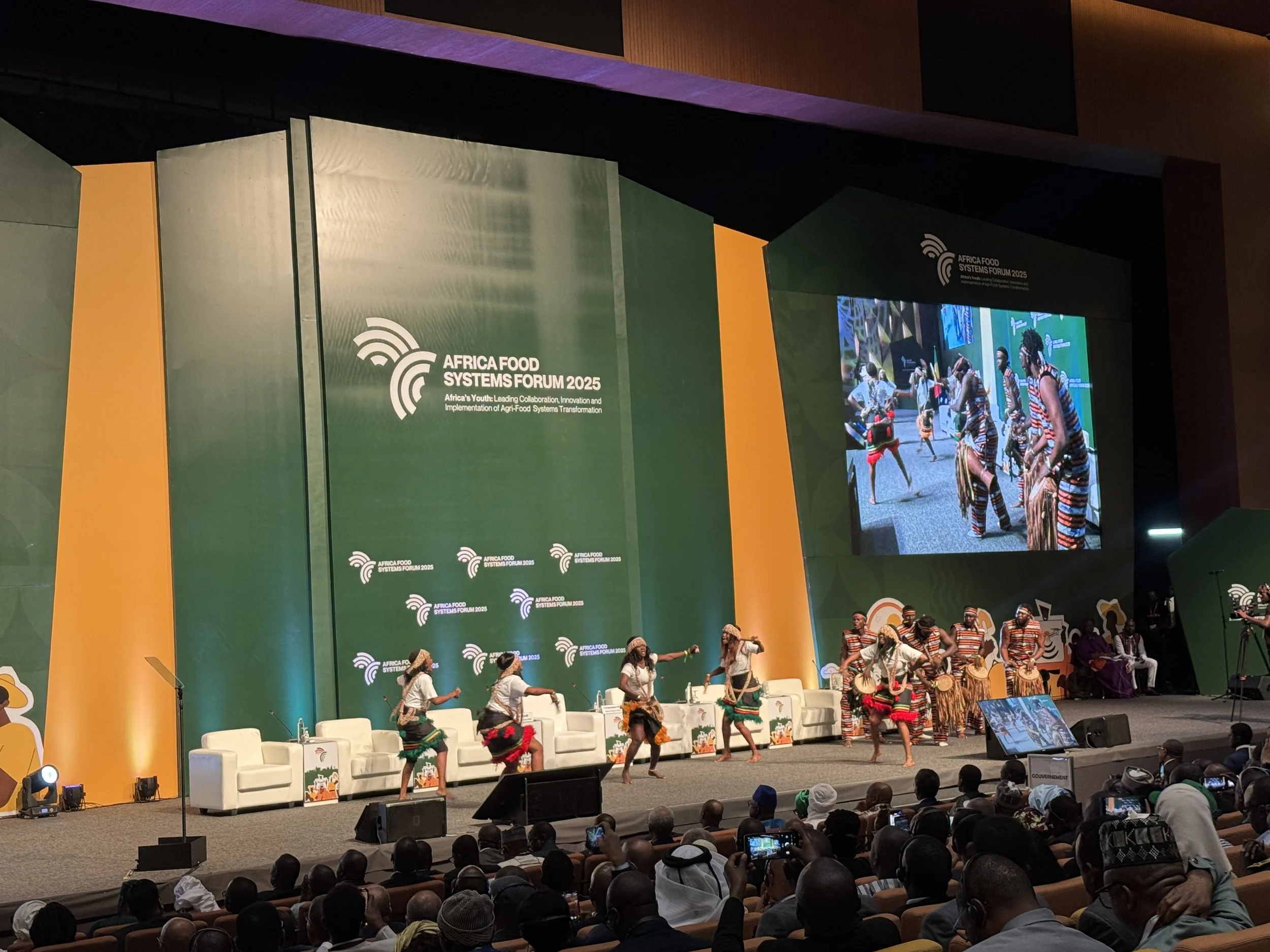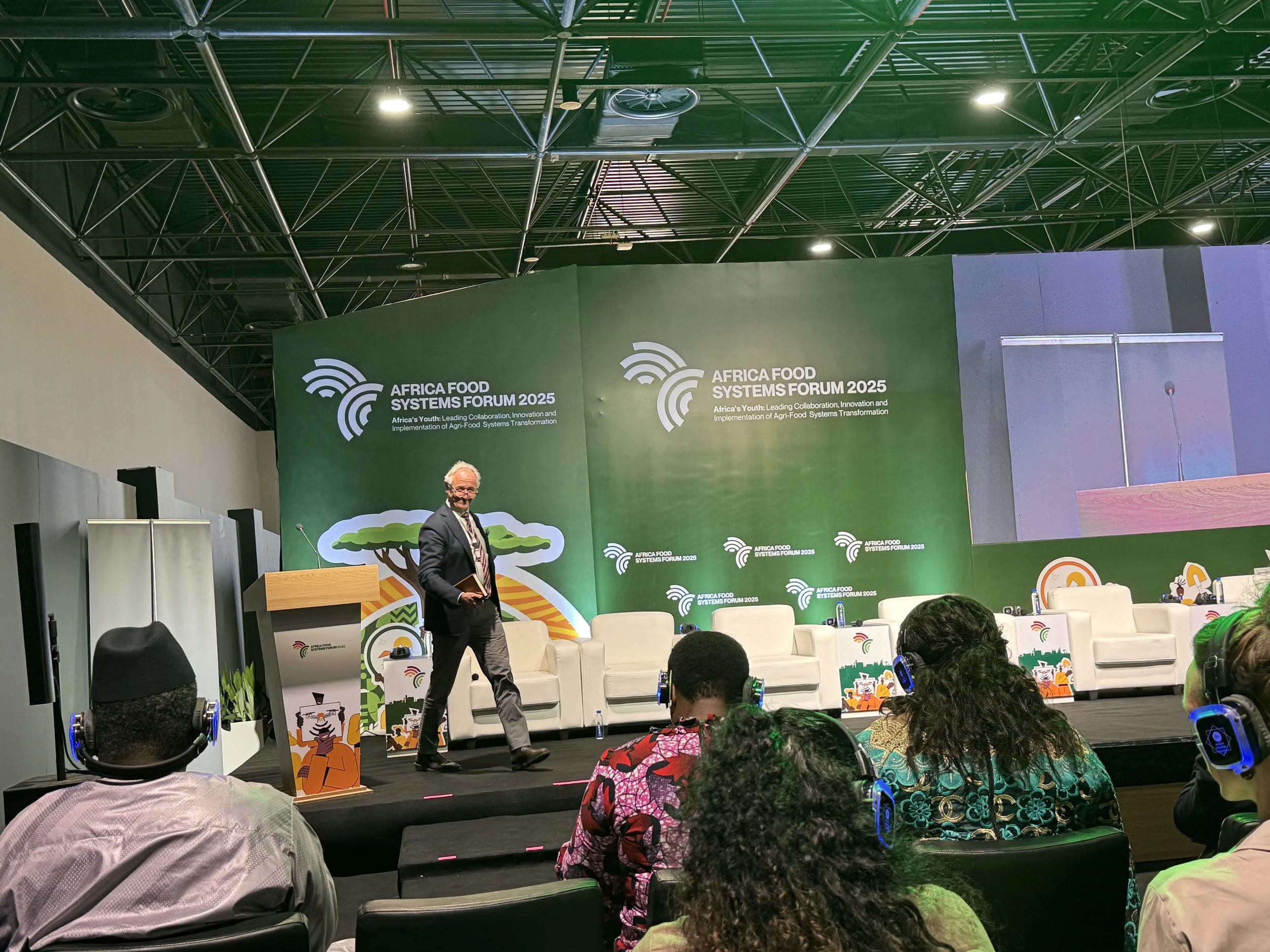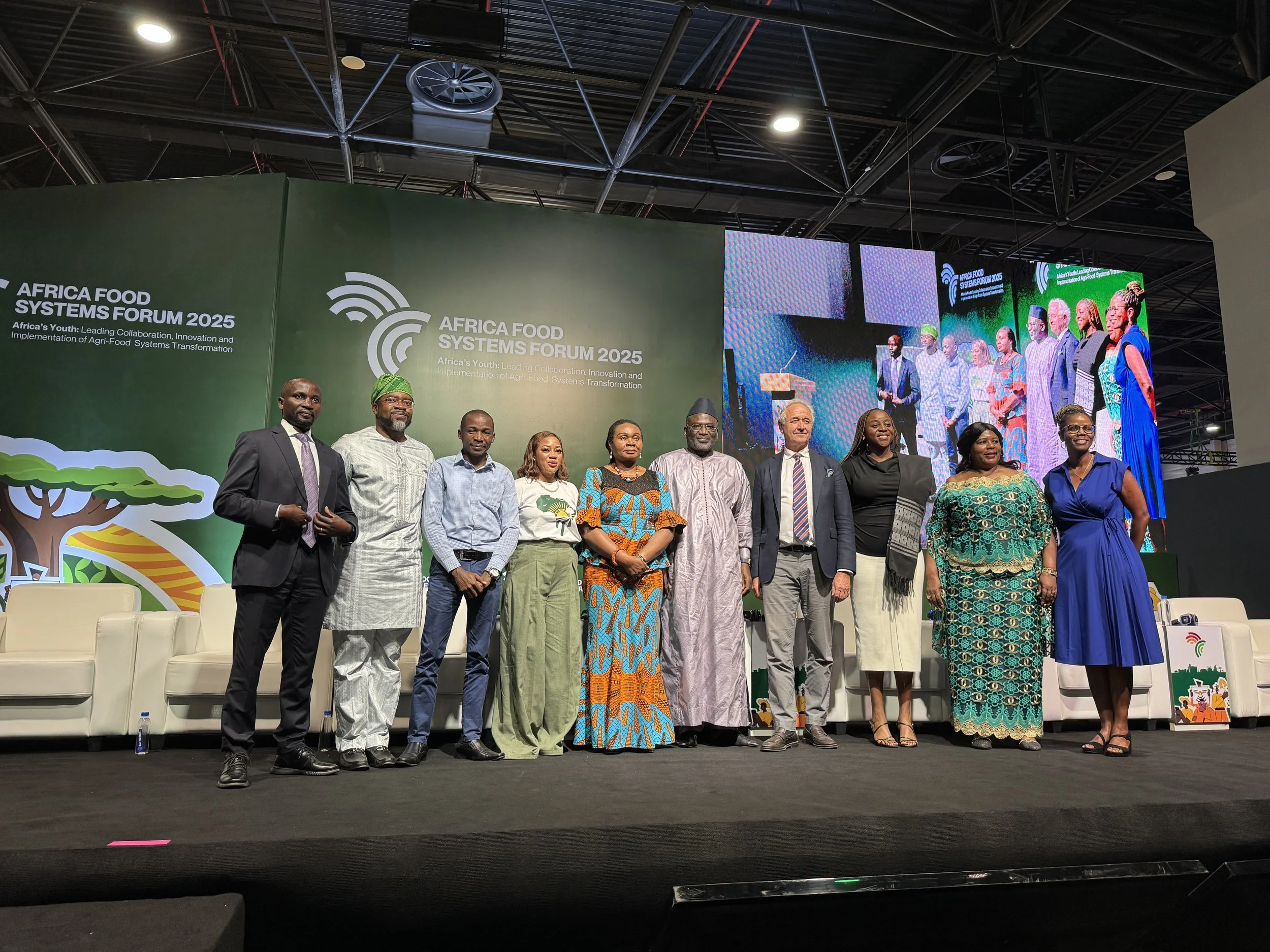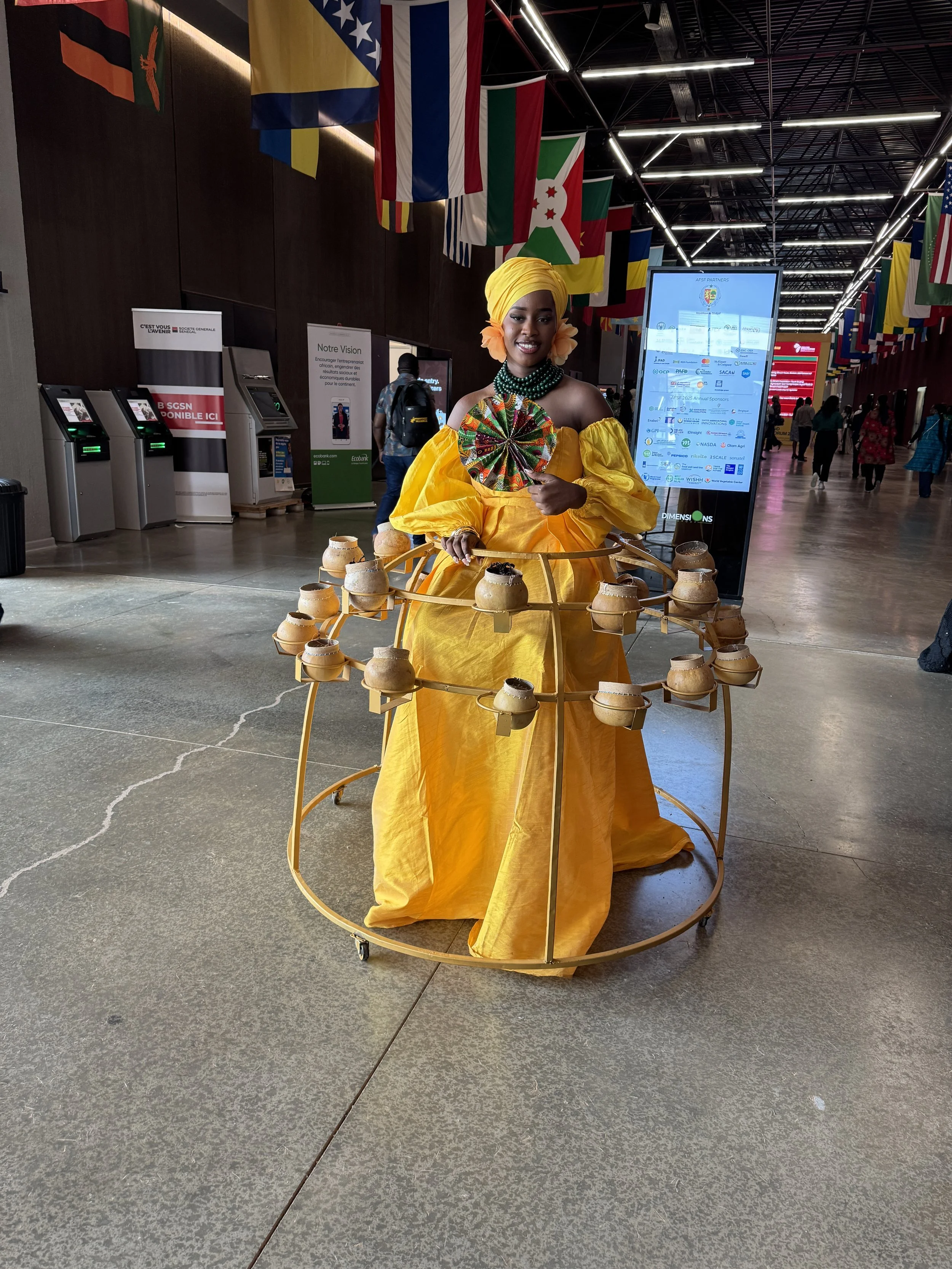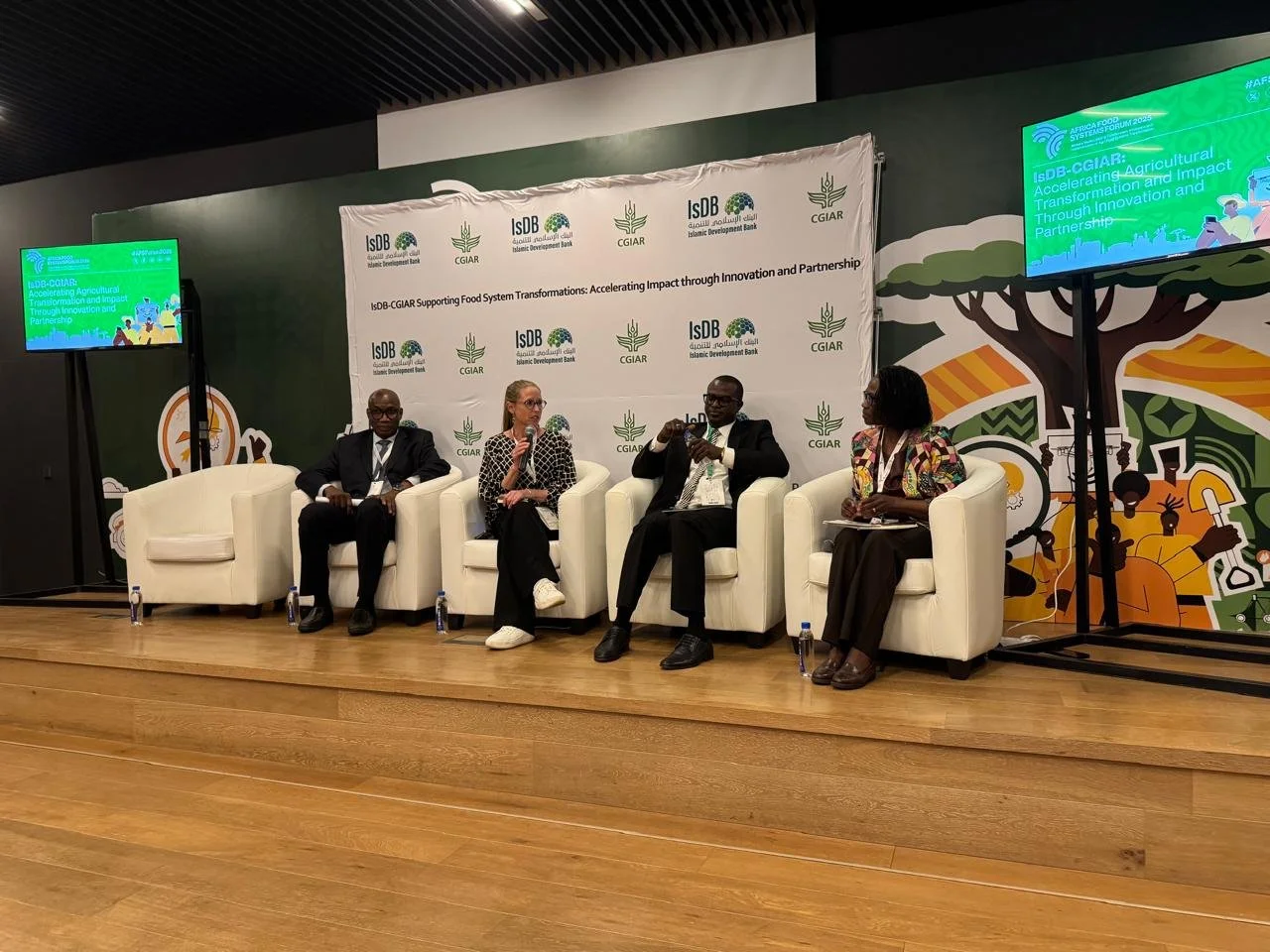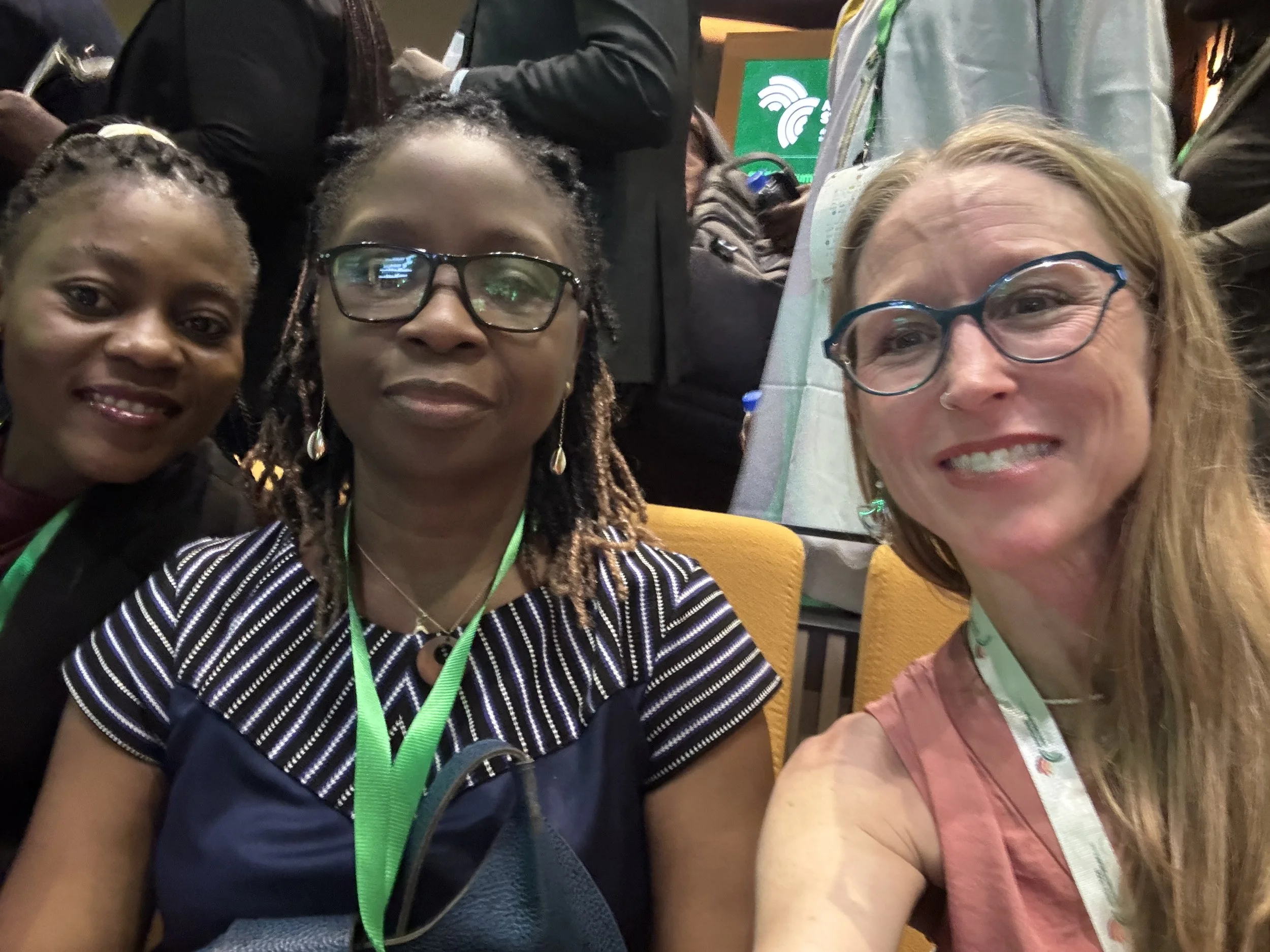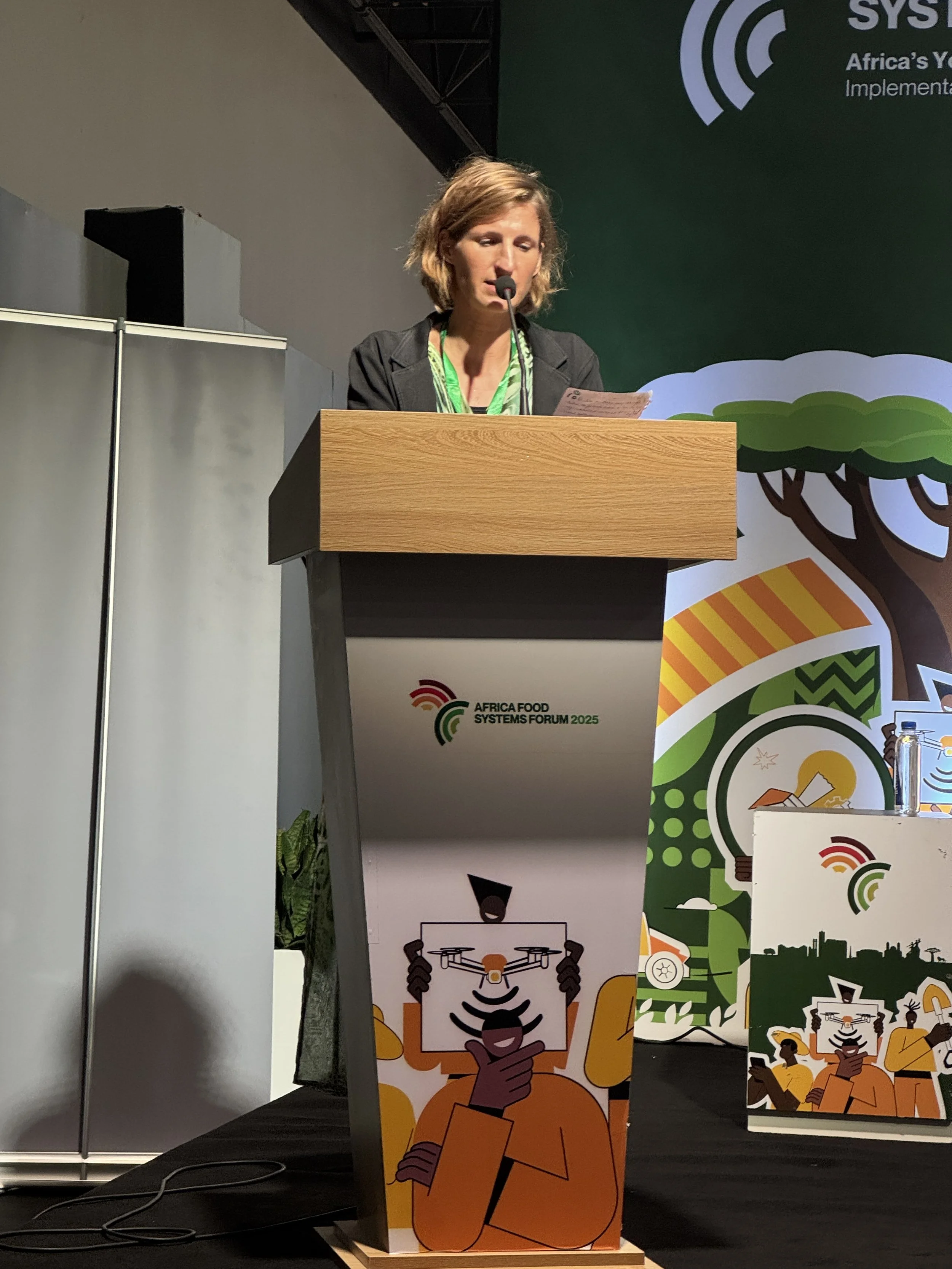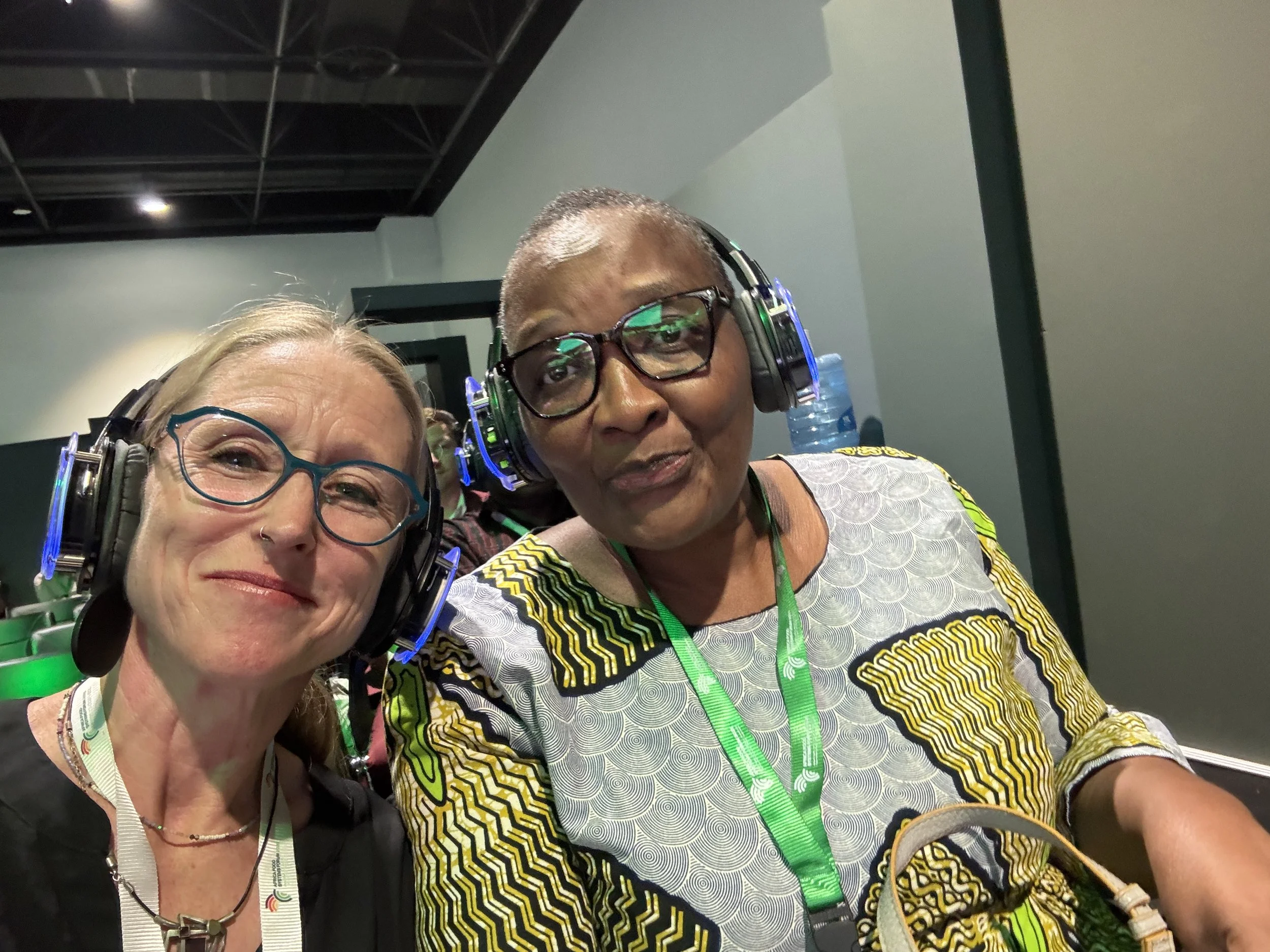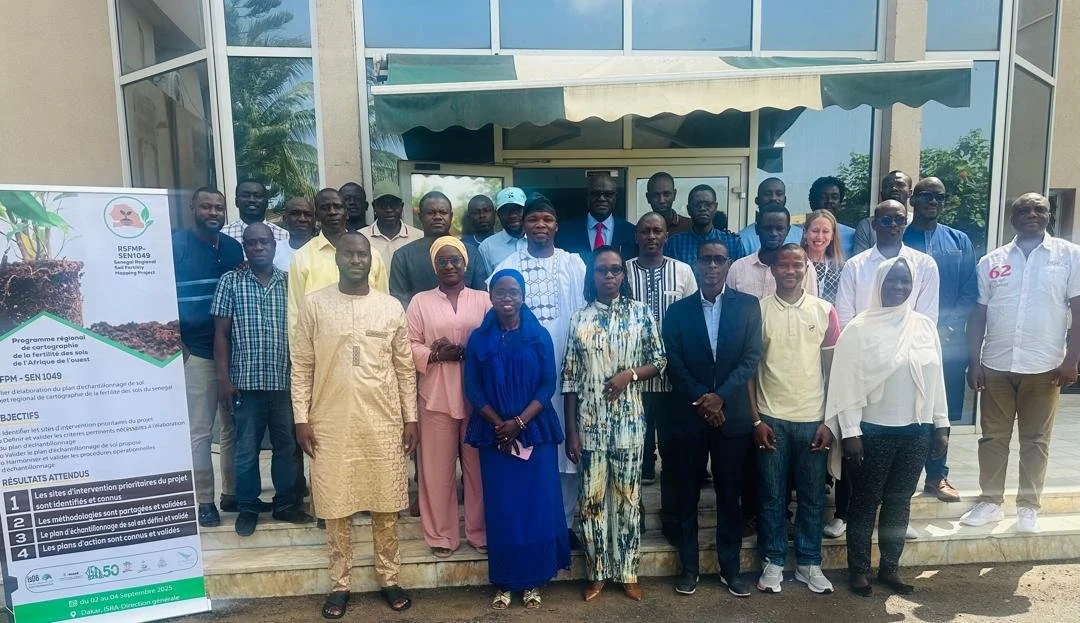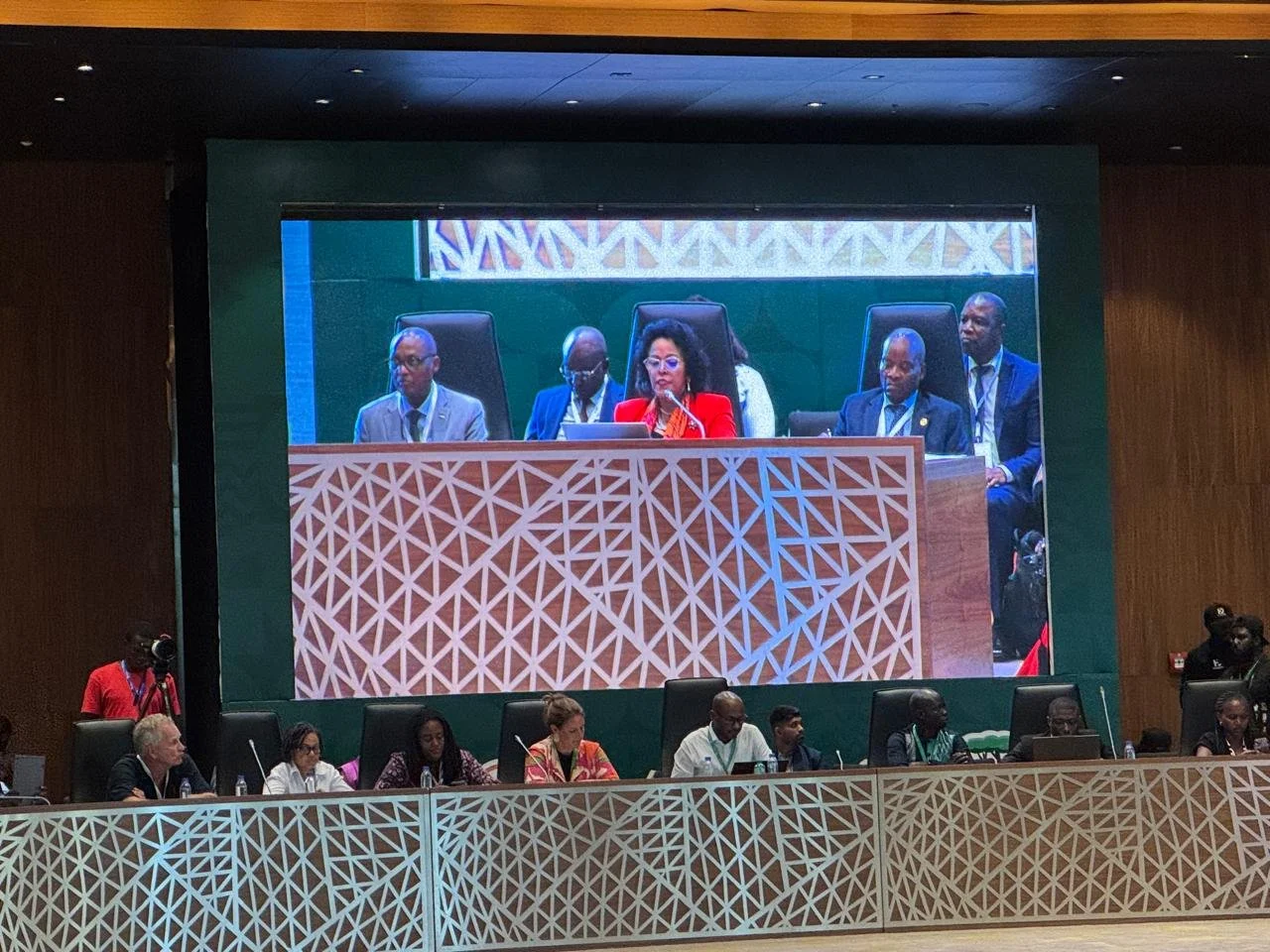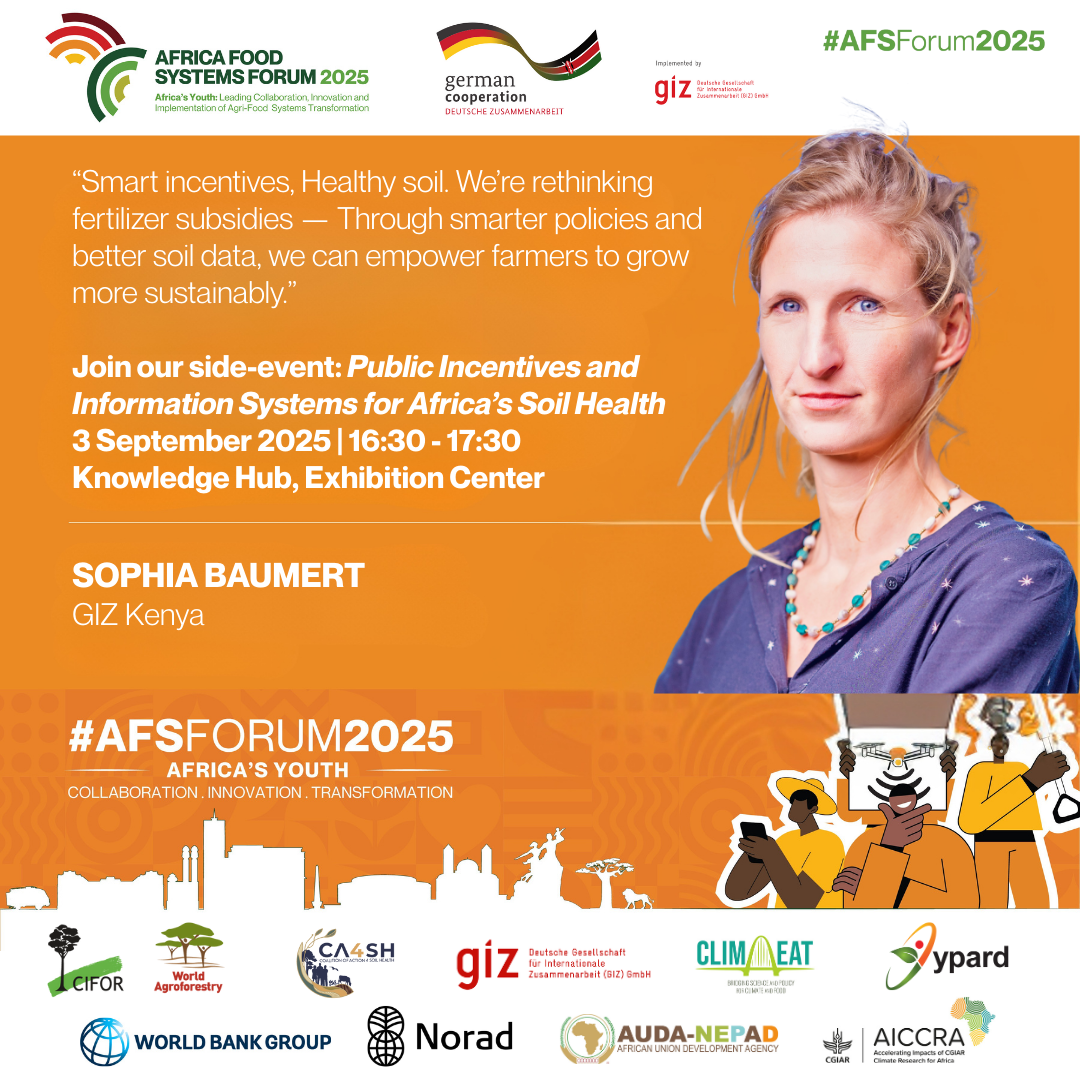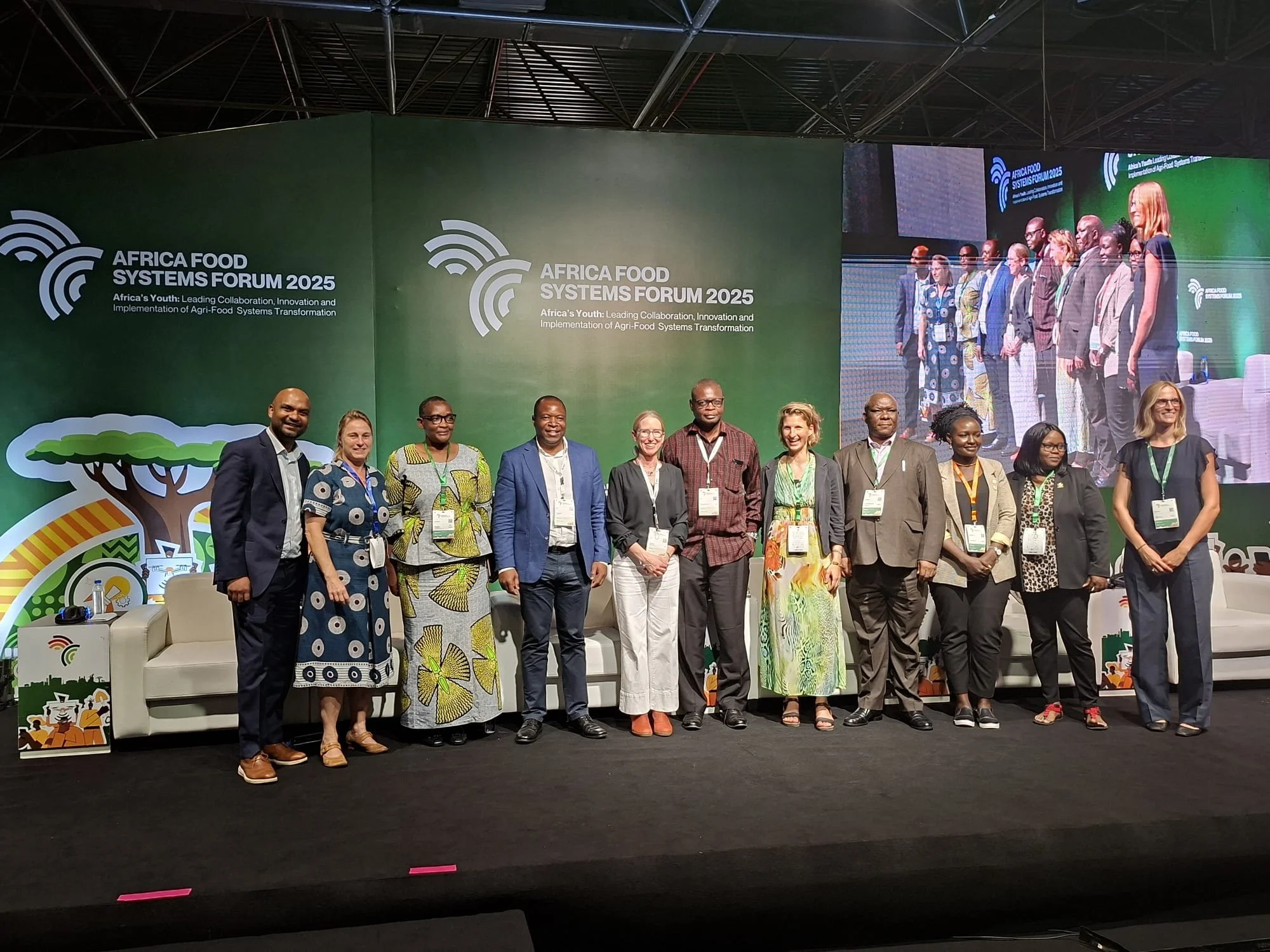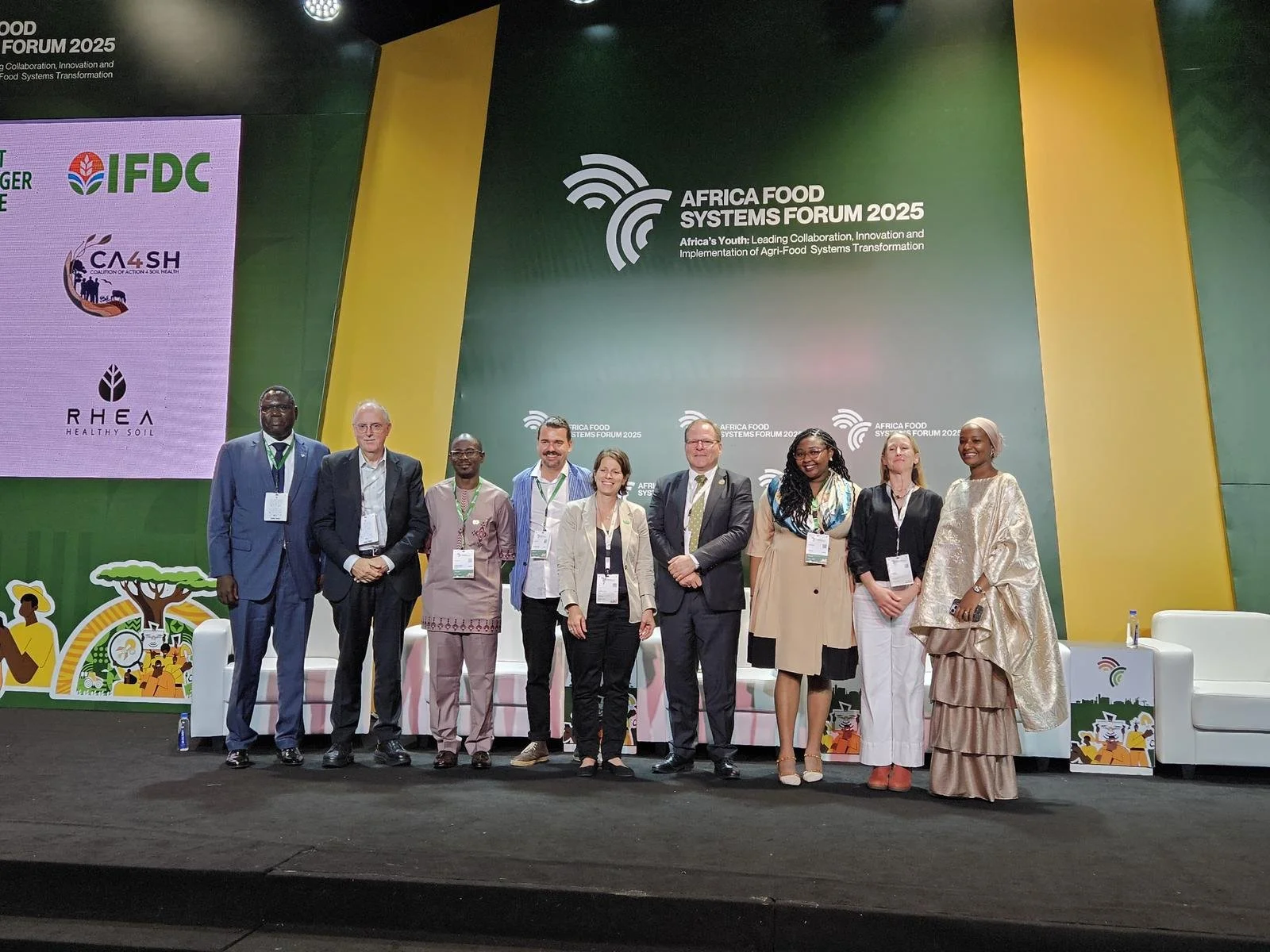Soil Health in Focus: CA4SH and Partners Position Soil Health and Youth at the Heart of Africa’s Food Systems at AFSF 2025
From 31st August, 2025 to 5th September, 2025, the 15th Africa Food Systems Forum took place in Dakar, Senegal under the theme "Africa's Youth: Leading Collaboration, Innovation and Implementation of Agri-Food Systems Transformation".
The Africa Food Systems Forum is the continent's leading platform for advancing inclusive and sustainable food systems. It attracts a large number of delegates and has a significant impact on agricultural policy and investment in Africa. The AFS Forum aims to foster collaboration and innovation within the African agri-food sector.
Soil health had a defining moment at the Africa Food Systems Forum 2025, which opened with a resounding statement from H.E. Moses Vilakati, Commissioner for Agriculture, Rural Development, Blue Economy, and Sustainable Environment (ARBE), African Union Commission, who prioritized soil health and mapping as foundational pillars for Africa’s agricultural transformation. His remarks set the tone for a series of high-impact discussions, affirming that soil is no longer a peripheral concern—it is central to policy, investment and innovation.
“I am proud to share that we have laid the foundation for a transformative agenda that places soil health and mapping, seed bank development and climate resilience, as well as job creation, at its core”
The 2025 forum convened over 6,000 stakeholders from 106 countries, representing more than 120 institutions. The attendees included stakeholders from civil society, business leaders, heads of state, and ministers. True to its theme, the forum ensured the participation of young leaders, innovators, farmers and policymakers at all events. The Coalition of Action for Soil Health (CA4SH), alongside partners and #Youth4Soil, played a pivotal role across multiple high-level sessions at the Africa Food Systems Forum 2025 (AFS Forum 2025), advancing the soil health agenda and youth engagement in sustainable agri-food systems transformation.
Read on for a summary of CA4SH engagements at the Forum.
H.E Nardos Bekele-Thomas, CEO of AUDA-NEPAD, reflects that only healthy soil can nourish people
Advancing the momentum of the Africa Fertilizer and Soil Health Action Plan
Continental leaders convened for a pivotal special event focused on accelerating the implementation of the Africa Fertilizer and Soil Health Action Plan (AFSH-AP). Hosted by the African Union Commission(AUC), AUDA-NEPAD, FARA, AGRA, and the AFSH coalitions, the session marked a critical moment in sustaining momentum following the Nairobi Declaration.
Moderated by Larry Umunna and Asseta Diallo, the event opened with a keynote address from H.E. Moses Vilakati, Commissioner for Agriculture, Rural Development, Blue Economy, and Sustainable Environment at the AUC. He emphasized the urgency of translating continental commitments into country-level action and highlighted the role of enabling policies in unlocking private sector engagement.
A ministerial panel moderated by Janet Edeme (AUC) brought together Hon. Reuben Mtolo Phiri (Zambia), Hon. Dr. Marc Bagabe (Rwanda), Hon. Dr. Mabouba Diagne (Senegal), Alain Sy Traore (ECOWAS), Domingos Gove (SADC), and Babafemi Oyewole (PAFO). Discussions centred on the domestication of the Action Plan, resource mobilization, and the need for tailored partnerships that reflect the diversity of stakeholders—including youth, women, and private sector actors.
An implementers panel moderated by Fatunbi Oluwole (FARA) showcased coalition leads including Sheila Keino (Sustain Africa), Antony Chapoto (C4PA), Lilian Lihasi (C4SEAS), Bernard Vanlauwe (CIFSH), and Martin Parr (C4SISA). Each shared updates on fertilizer distribution, policy advocacy, extension services, and soil data systems.
Dr. Leigh Winowiecki, Global Research Lead at CIFOR-ICRAF and Co-Lead of CA4SH, served as a panellist on the Technical Panel on accelerating fertilizer access and sustainable soil health. Moderated by Shamie Zingore, the session brought together key actors to identify priority actions and resource needs for implementing the Africa Fertilizer and Soil Health Action Plan.
She delivered a passionate appeal for data-driven decision-making and underscored the need for robust soil information systems that are accessible, interoperable and actionable. “We must turn data into decisions,” she said, “and ensure that soil health is not just monitored—but managed,” reflecting on the pilot Initiative of CA4SH alongside NORAD, VARDA and CIFOR- ICRAF to advance soil knowledge. Dr. Winowiecki also highlighted the role of youth in driving innovation and scaling solutions.
Ms. Nana Aisha-Mohammed, Regional Director for West Africa at AFAP, highlighted the need for regional coordination and policy harmonization. She pointed out that fragmented trade policies and inconsistent subsidy frameworks hinder private sector growth. Aisha-Mohammed advocated for public-private platforms that align national strategies with continental goals, enabling smoother fertilizer distribution and market access.
Mr. David Auerbach, Co-founder and President of Regen Organics, emphasized three key points in his remarks:
He championed circular economy models in fertilizer production, turning organic waste into high-quality agricultural inputs.
He emphasized the potential to reduce import dependency and improve soil health through locally sourced, sustainable solutions.
He called for greater investment in local innovation ecosystems that integrate waste management, nutrient recycling, and job creation.
Speaking about the power of open-access soil data platforms and interoperable systems. Mr. Simone Sala, Executive Director of the VARDA Foundation, advocated for collaborative data ecosystems that allow private companies, governments, and researchers to co-create solutions. Sala emphasized that transparency and trust are essential to scaling soil health interventions.
Closing remarks of the special event by H.E. Nardos Bekele-Thomas, CEO of AUDA-NEPAD, reinforced the need for coordinated action, inclusive participation, and sustained investment to transform Africa’s food systems through soil health.
IsDB-CGIAR Supporting Food Systems Transformation: Accelerating Impact Through Innovation and Partnership
This event spotlighted how science-driven solutions, strategic partnerships such as the ones highlighted in the Multistakeholder Engagement to Scale Soil Health Globally: The Coalition of Action 4 Soil Health publication and co-financing models are reshaping Africa’s food systems and driving resilience across member countries.
Opening the session, Dr. Stanford Blade, Deputy Director General for Research at ICRISAT , framed the objectives: unlocking opportunities for member states to transform food systems and enhance trade. H.E. Dr. Mabouba Diagne, Senegal’s Minister for Agriculture, delivered a welcome address emphasizing the urgency of building climate-resilient and inclusive food systems.
Dr. Nabil Ghalleb and Mr. Ougfaly Badji of IsDB presented the Food Security Response Program and the CGIAR partnership model, highlighting how regional programs are designed and implemented to support agriculture, resilience, and socioeconomic development. Hon. Raphael Magyezi, Uganda’s Minister of Local Government, shared success stories from the Local Economic Growth Support (LEGS) Program, illustrating how strategic partnerships can link national policy with grassroots transformation.
The first panel, moderated by Dr. Namukolo Covic of ILRI, focused on transforming value chains. Experts from Africa Rice , IITA, CIFOR-ICRAF, and Agrobiotech Mali discussed the role of scientific innovation in scaling regional programs and meeting both domestic and export demands. They emphasized the importance of collaboration between governments, technical partners, and co-financiers in delivering impact.
The second panel, moderated by Dr. Joyce Maru of CIP , explored investment opportunities. Panelists from the World Bank, AfDB , CIP, ICRISAT, and ILRI addressed critical investment gaps and proposed strategies to unlock trade potential in millet, sorghum, potato, and livestock value chains. They called for stronger engagement from multilateral development banks and innovative financing mechanisms to scale regional programs.
Audience interventions followed, offering reflections and reinforcing the need for inclusive, youth-driven approaches. The session culminated in a fireside chat moderated by Dr. Covic, featuring Dr. Himanshu Pathak (ICRISAT), Prof. Appolinaire Djikeng (ILRI), and Dr. Simon Heck (CIP). The discussion highlighted how science and innovation bridge food system gaps and how partnerships like IsDB–CGIAR can accelerate transformation across Africa.
Dr. Stanford Blade closed the session by thanking all participants for their thoughtful engagement and contributions throughout the event. He emphasized that the conversations sparked in the room must continue beyond it—through partnerships, policy, and practice.
Key Takeaways:
The session issued a strong call to action for governments, investors, innovators, and Africa’s youth to unite in scaling food system solutions.
Emphasized the central role of science and evidence-based innovation in driving transformation.
Highlighted partnerships as the key engine powering progress toward resilience, equity, and sustainability.
Public Incentives & Information Systems for Soil Health
The session titled Public Incentives & Information Systems for Soil Health brought together a diverse group of stakeholders committed to advancing Africa’s food systems transformation through improved soil governance. Held within the framework of the CAADP Kampala Strategy and Action Plan, the event spotlighted the central role of soil health and the need to provide appropriate incentives through public policy and support programs. It also emphasized the importance of robust soil health information systems to help African Union Member States integrate soil priorities into national planning processes.
Opening remarks were delivered by Sophia Baumert, Project Manager at GIZ, who outlined the session’s objectives and framed the discussion around the urgency of aligning soil health with national development strategies.
Moderated by Leigh alongside Clim-Eat’s Daan Schuttenbelt, the panel featured speakers from GIZ, the World Bank, AUDA-NEPAD, YPARD, and ministries of agriculture from Kenya, Zambia, and Malawi. Each speaker brought unique insights into how public incentives and data systems can drive soil health improvements across Africa.
Joshua Gill, Senior Economist in the Agriculture and Food Global Practice at the World Bank, introduced the Repurposing Agenda, which advocates for redirecting existing agricultural support toward sustainable soil health outcomes. He emphasized the need to rethink how public resources are allocated to ensure long-term productivity and environmental resilience.
Manyewu Mutamba, Head of Food Systems at AUDA-NEPAD, highlighted the importance of integrating soil information systems into continental frameworks, setting the stage for policy coherence and innovation across member states.
Representing the youth, Jenice Achieng, YPARD Kenya Country Representative, spoke on the importance of soil information systems for youth in agriculture. She emphasized that governments and implementing organizations must engage youth meaningfully to achieve results, particularly in the context of data access, capacity building, and policy influence.
“Soil Information is power - Empowering young people to move from guesswork to smart evidence-based farming.”
Simon Muchigiri, Head of Farm-Input at Kenya’s Ministry of Agriculture and Livestock Development, shared that Kenya is currently developing a new policy framework for managing fertilizer subsidies. He explained why this reform is urgently needed and how it will incentivize better soil health management while improving the efficiency of public resource use. He also outlined key elements for reform, including private sector inclusion, soil health outcomes, productivity gains and youth engagement.
From Zambia’s Ministry of Agriculture, Harriet Matipa discussed the country’s Farmer Input Support Program and the implementation of an eVoucher system that equips farmers with a voucher credited with the input subsidy value. She reflected on lessons learned from the pilot and how these insights can be integrated into the domestication of the AFSH Action Plan. She further addressed the main soil health and fertilizer-related challenges that need to be anchored in existing agricultural policies and strategies.
Gertrude Kambauwa, Director of the Land Resources Conservation Department at Malawi’s Ministry of Agriculture , shared experiences from Malawi’s pilot program to repurpose subsidies through the Affordable Inputs Program. She discussed the lessons learned and opportunities for scaling the initiative both within Malawi and across the region.
Ingvild Langhus, Senior Advisor at Norad delivered the closing remarks, outlining next steps for advancing soil information systems, strengthening policy coherence, and designing inclusive incentive mechanisms across Africa. She emphasized the importance of multi-level coordination and cross-sector collaboration to ensure that soil health remains central to agricultural transformation efforts.
Key Outcomes:
Youth Engagement Actioned: Concerns and solutions were raised by the youth, with partners committing to integrate youth participation into soil governance and incentive mechanisms.
Policy Coherence Strengthened: Soil health as positioned within CAADP frameworks, if aligned into national agricultural policies will support sustainable food systems across Africa.
Incentive Mechanisms Identified: Public support tools such as repurposed fertilizer subsidies and payments linked to soil amendment practices were highlighted as scalable solutions.
Soil Information Systems Elevated: The importance of robust, accessible soil data systems was emphasized as a foundation for evidence-based planning and monitoring.
Cross-Sector Collaboration Enhanced: The session fostered peer learning and multi-level coordination to scale soil monitoring systems and ensure inclusive implementation across regions and sectors.
This session marked a critical step in aligning public policy, data systems, and youth leadership to restore Africa’s soils and secure the future of its food systems.
Scaling Soil Health and Sustainable Production in Fragile Settings: Realizing the 3 Rio Conventions
Dr. Winowiecki moderated this thematic session focused on implementing The Rio Conventions through soil health and sustainable production in fragile contexts. The panel featured global experts, including Prof. Joachim von Braun, IFDC , Welthungerhilfe, CORAF, and youth climate leaders.
The session brought together over 200 participants to explore how soil health, sustainable agriculture, and seed systems can drive progress across the three Rio Conventions—climate change (UNFCCC), biodiversity (UNCBD), and desertification(UNCCD)—while improving livelihoods in fragile contexts.
Prof. Joachim von Braun, Vice Chair of WHH’s Board and President of the Pontifical Academy of Sciences, opened the session with remarks that addressed the collapse of overseas development assistance and questioned whether the Rio Conventions remain achievable amid global funding cuts. His call to action emphasized the need for bold, coordinated strategies to restore ecosystems and build climate resilience.
The first panel, “Defining the Challenge,” featured Bettina Iseli (WHH), Henk van Duijn (IFDC), Dr. Moumini Savadogo (CORAF), Priscilla Wakarera (Rhea), and Zeinaba Narabene (Network of Young Sahelians for Climate). Panellists reflected on the dramatic shifts since AFSF 2024, including the disappearance of USAID and widespread reductions in development assistance. They discussed the implications for soil degradation, biodiversity loss, and climate vulnerability—especially in fragile states. Youth leader Narabene highlighted the disproportionate impact of this challenge on youth in the Sahel, while Wakarera emphasized the private sector’s role in addressing land degradation and desertification.
In the second panel, “Addressing the Challenge,” speakers shared successful examples of cooperation and synergy. Van Duijn showcased IFDC’s partnerships that align fertilizer strategies with climate goals. Iseli discussed WHH’s transition from short-term relief to long-term dubbed locally driven food systems transformation. Wakarera explored innovative financing models, including private sector contributions, while Narabene called for stronger connections between youth innovation and national food systems agendas.
The session concluded with an interactive Q&A, followed by closing remarks from Prof. Alain Sy Traoré, Director of Agriculture at ECOWAS. He emphasized the strategic priorities needed to advance Africa’s soil health agenda and cited youth engagement as a force for the desired success.
This side event reinforced that achieving Rio synergies requires more than technical solutions—it demands political will, inclusive financing, and multistakeholder collaboration. As global aid landscapes shift, Africa’s food systems must be built on resilience, equity, and shared commitment.
Plenary - Healthy & Productive Ecosystems: Africa Fertilizer & Soil Health Initiative
Political Leadership and Resource Mobilization took Center Stage at Africa Fertilizer & Soil Health Plenary. This session spotlighted the urgent need to translate political commitments into practical action to restore Africa’s soils and strengthen food systems. Moderated by Ms. Thule Lenneiye, Chief of Staff at AGRA, the plenary brought together high-level policymakers, technical experts, and youth leaders to explore financing, policy reform and collaborative strategies for soil health.
The first panel focused on political leadership and featured Hon. Marième Soda Ndiaye (Senegal), Hon. Ahmed El Bouari (Morocco), H.E. Paul Gulleik Larsen (Norway), Prof. Dr. Obert Jiri (Zimbabwe), Dr. Ildephonse Musafiri (AUDA-NEPAD), H.E. Dr. Meles Mekonen Yimer (Ethiopia), and Ms. Chidinma Mary Ezeh (Young Professionals for Agriculture Development (YPARD) Nigeria). Panelists discussed how national governments and the African Union can unlock financing for local fertilizer programs, integrate climate resilience into agricultural policies, and ensure smallholder farmers benefit from national strategies. Ms. Ezeh emphasized the importance of youth leadership in shaping political commitment and challenged leaders to commit to capacity building.
“Youth need mentorship to influence food systems transformation effectively, The older generation must take interest in mentoring the young people.”
Her message reinforced a central theme of the forum: that sustainable transformation requires shared leadership. By equipping young people with the tools, knowledge, and support to lead, Africa can unlock a future where innovation and tradition work hand in hand to build resilient food systems.
The second panel on resource mobilization featured Prof. Aggrey Agumya (FARA), Mr. Mehdi Filali (OCP Africa), Dr. Leigh Ann Winowiecki (CIFOR-ICRAFand CA4SH Co-Lead), Dr. Christian Witt (Gates Foundation), Mr. Oystein Botillen (Yara International ), and Dr. El Hadj Adama Toure (World Bank). Discussions centred on financial innovations, private sector engagement, and the role of multilateral institutions in supporting soil health.
Dr. Winowiecki delivered a powerful call to action
“We depend on healthy soil for nutritious food, climate action, biodiversity, and ecosystem restoration. Soil is the most biodiverse ecosystem in the world. We need to come together and invest in soil health. To do that we need robust, systematic data—and we must turn that data into action.”
— Dr. Leigh Winowiecki, CIFOR-ICRAF Global Research Lead & CA4SH Co-Lead
Speakers underscored the need for collaboration between governments, finance institutions, research bodies, and the private sector to build integrated soil health and nutrient management capacities. They also highlighted the importance of repurposing existing financing, de-risking procurement and distribution, and supporting local fertilizer production to ensure long-term sustainability.
In closing, H.E. Moses Vilakati, Commissioner for Agriculture, Rural Development, Blue Economy, and Sustainable Environment at the African Union Commission emphasized strategic priorities for advancing Africa’s soil health and called for the empowerment of youth to lead this charge.
The plenary reinforced that political leadership, technical expertise, and innovative financing are essential to operationalize the Africa Fertilizer and Soil Health Action Plan. It marked a decisive step toward aligning ambition with action to build resilient, productive ecosystems across the continent.
#Youth4Soil at AFS
The youth gave a strong stance of their vision for Africa's food systems, find a few quotes from our vibrant #Youth4Soil cohort.
Chidinma Ezeh, YPARD Nigeria
“With the power of digital media and story telling, youth can turn soil health from a technical agenda into a continental movement, we've seen this happen with the youth networks such as YPARD and CA4SH #Youth4Soil.”
Ajuna Tadeo, YPARD Uganda
“We are tired of talking about our problems in the food systems space, as young people, we are here to co-create solutions.”
Innocent Cosmas Msoka, Tanzania
“The focus was clear, bridging wisdom and fresh perspectives to strengthen collaboration while shaping ecosystems that genuinely empower young voices to lead and influence decision making at every level.”
Christine Haule Ushindi Ventures, Tanzania
“There's a need to invest in training, education and apprenticeship to prepare young women to lead.”
Priscilla Wakarera, RHEA
“In Dakar, we were reminded that restoring soil health is not just a technical priority but a political, social and economic imperative.”
All these youth carried the load of the youth they represent relentlessly and carried forward the vision of all #Youth4Soil members that could not join in person
CA4SH, through it's partners, #Youth4Soil and Dr. Winowiecki’s leadership and technical expertise, helped shape the Forum’s outcomes, reinforcing the central role of soil health in Africa’s food systems transformation. Their engagement across panels reflects a commitment to science-based action, inclusive partnerships, and youth engagement
At AFS 2025, one message rang clear: Soil health data is only as powerful as the action it inspires. Across plenaries and panels, leaders, researchers, and youth advocates echoed a shared truth—collecting information is not enough. If data is left to sit silent, it cannot guide the policies, investments, and practices needed to transform Africa’s food systems.
This year’s conversations moved beyond diagnostics and into the realm of accountability. From the lab to the field, from the young to the old, we must ensure that soil health data is not just stored—but shared, applied, and lived. It must shape decisions at every level, from national budgets to local farming practices. It must be translated into tools that farmers can use, policies that governments can fund, and innovations that communities can trust.
Moving Forward
We invest in systems that speak to each other. We empower youth to lead with evidence. We build trust between governments and farmers. And we treat soil not as a resource to be extracted—but as a living foundation to be restored.
Let this be our rallying cry: Let the data breathe. Let it move. Let it grow. Because only then can it nourish the future we’re all working toward.
